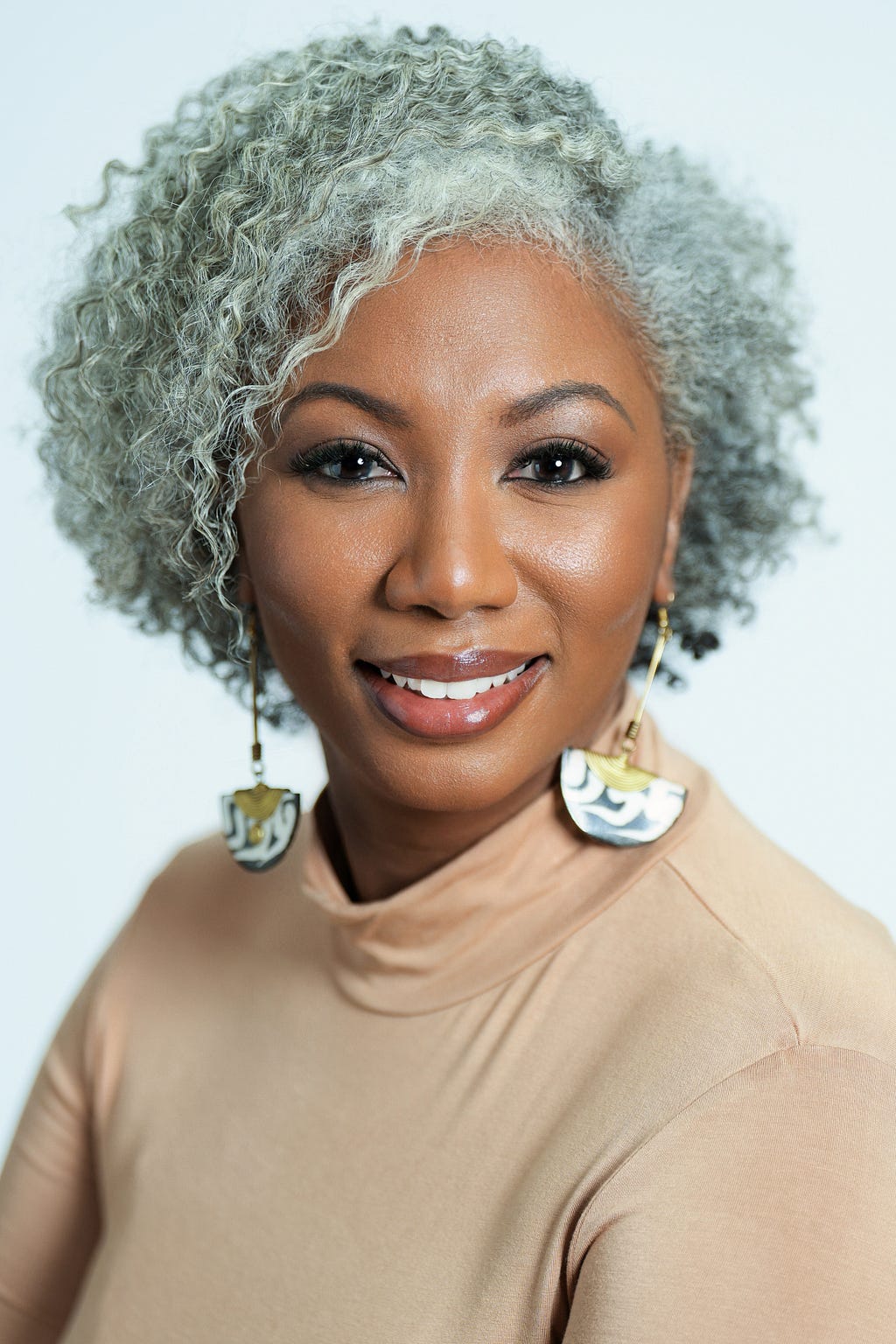Chenee Joseph of the Historic District Development Corporation On 5 Steps We Must Take To Truly Create An Inclusive, Representative, and Equitable Society

Equity, Openness, and Fairness in Policies: Equitable policies across sectors are important for a just society. We must address systemic barriers that disadvantage certain communities. For example, accessible public education lowers income inequality rates by providing a level playing field for all backgrounds.
As part of our series about ‘5 Steps We Must Take To Truly Create An Inclusive, Representative, and Equitable Society’ I had the pleasure to interview CHENEE’ JOSEPH.
Chenee Joseph serves as the President and CEO of HDDC, a nonprofit organization established in 1980 by Dr. Coretta Scott King, Christine King Farris, and John Cox.
Focused on preserving the history of the Old Fourth Ward and Sweet Auburn Districts connected to Dr. Martin Luther King Jr.’s childhood home, HDDC also offers affordable housing solutions.
To date, HDDC has constructed 124 single-family homes, 500 multi-family units, and 200k sq ft of commercial space.
With a background in construction and urban planning, Joseph is now spearheading a $32M project while remaining devoted to community development and fair housing.
Thank you so much for doing this with us! Before we dig in, our readers would like to ‘get to know you’. Can you tell us a bit about how you grew up?
I grew up in the beautiful Virgin Islands as the eldest of two siblings. My parents always put in tremendous effort to create a nurturing and supportive environment for us. Living on the islands, we were surrounded by natural beauty that greatly influenced my interests and passions. This led me to develop a love for architecture and agriculture.
My grandfather was a real estate developer whose work has certainly left an impact on me. With such a background, I can confidently say that being involved in this industry has always been in my genes.
Is there a particular book that made a significant impact on you? Can you share a story or explain why it resonated with you so much?
“Peachtree Meets Sweet Auburn” by Gary Pomerantz deeply resonated with me. It’s a detailed biography of Atlanta that tells the story of two prominent families — one white and one black — who rose to power over five generations in a city that was segregated. The book provides a unique perspective on the city’s history.
It gave me a deep understanding of the area and its history, which felt very relatable, especially regarding my work as CEO and President of Historic District Development Corp (HDDC). The book has instilled a strong sense of ownership and connection to the community and the city I serve.
Do you have a favorite “Life Lesson Quote”? Do you have a story about how that was relevant in your life or your work?
The quote that resonates deeply with me is, “When people show you who they are, believe them.”
This quote has guided me through various situations in both my personal and professional life, helping me form genuine connections and make better decisions based on the true character of others.
Additionally, the phrase “To whom much is given, much is required” has played an essential role in shaping my sense of responsibility and purpose.
The opportunities and experiences I’ve been fortunate enough to encounter have not only enriched my life but also placed me in a unique position to drive change and contribute meaningfully to others.
This awareness encourages me to continually strive for growth, productivity, and positive impact.
How do you define “Leadership”? Can you explain what you mean or give an example?
I think of leadership as an ongoing process. As a leader, I believe it is essential to utilize resources to make a positive impact within the community. This includes being a friend to marginalized individuals, advocating for equity, and contributing to the advancement of justice.
Leadership goes beyond guiding a team; it’s about being a positive example. Creating an environment where everyone feels valued and heard allows us to achieve our shared goals. The core of leadership is inspiring others and making lasting improvements for the benefit of society.
Ok, thank you for all that. Now let’s move to the main focus of our interview. In the summer of 2020, the United States faced a very important self-reckoning about race, diversity, equality and inclusion. This is, of course, a huge topic. But briefly, can you share your view on what made the events of 2020 different from racial reckonings in the past?
In my view, there isn’t a significant difference between past and present racial reckonings. However, 2020 stood out due to the increased visibility provided by social media, leading to broader media coverage.
This heightened exposure undoubtedly raised awareness of these issues and ignited crucial conversations on race and equality. Corporations pledged to change but largely failed to take action.
The rollbacks on Affirmative Action and ongoing struggles in schools and communities appear regressive. The reckoning has enabled ‘cancel culture’ to address racism and inequalities, unifying people across ethnicities, particularly thanks to Generation Z. Hopefully, this will lead to the change needed to tackle these issues.
Can you tell our readers a bit about your experience working with initiatives to promote Diversity and Inclusion? Can you share a story with us?
In my experience with diversity and inclusion efforts, I have dedicated the majority of my career to preserving Atlanta’s Old Fourth Ward’s history, encompassing the significant Sweet Auburn neighborhood — the birthplace of Dr. Martin Luther King, Jr.
This organization is committed to maintaining affordable housing, fostering diversity, and encouraging inclusiveness in the community.
For almost four decades, HDDC has rejuvenated properties, establishing over 124 single-family residences, more than 500 multi-family living spaces, and 200k sq. ft. of commercial areas while addressing food sustainability and targeting food deserts in areas vulnerable to gentrification.
This may be obvious to you, but it will be helpful to spell this out. Can you articulate to our readers a few reasons why it is so important for a business or organization to have a diverse executive team?
Having an executive team that embraces diversity is essential to bring a variety of backgrounds, experiences, and expertise together to foster innovative solutions.
It’s important to recognize and celebrate differences in race, economic background, and gender to appreciate diversity. Doing so leads to greater creativity, problem-solving abilities, and decision-making capabilities.
Inclusivity is key to creating a harmonious workplace where each team member can contribute their unique strengths.
Essentially, promoting diversity within the leadership of any company or institution is crucial for nurturing innovation, inclusiveness, and efficiency.
This facilitates the exchange of distinct ideas from different perspectives while cultivating an inclusive atmosphere that values each individual’s uniqueness and strengths.

Ok. Here is the main question of our discussion. You are an influential business leader. Can you please share your “5 Steps We Must Take To Truly Create An Inclusive, Representative, and Equitable Society”?
1. Community-led Initiatives: Involving community members in decision-making processes for local projects ensures that the needs and values of the neighborhood are accurately represented and addressed.
2. Develop mixed-income communities: To create an equitable society, we must ensure that every citizen has access to resources and opportunities, regardless of their financial status.
3. Diversity Leaders in Government and Community: Representation matters in both government and community organizations. By promoting diversity in these roles, we ensure that multiple perspectives are considered as decisions are made, and we create a more inclusive environment for everyone.
4. Equity, Openness, and Fairness in Policies: Equitable policies across sectors are important for a just society. We must address systemic barriers that disadvantage certain communities. For example, accessible public education lowers income inequality rates by providing a level playing field for all backgrounds.
5. Responsible Voting: The right to vote empowers individuals with the ability to shape their communities through political decision-making processes. By researching candidates’ policies thoroughly before casting a ballot, voters can guarantee that they are supporting leaders who prioritize inclusivity and equity for all members of society.
By embracing these steps collectively, we can build an inclusive, representative, and equitable society that is supportive of every individual’s needs, values, and aspirations.
We are going through a rough period now. What makes you optimistic about the future of the US? Can you please explain?
I understand that we are going through a challenging period, but I remain optimistic about the future of the US for a few key reasons.
The informed and engaged young generation challenges the status quo with their fresh perspective. They have responded to recent events such as the George Floyd protests, Sandy Hook, and mass shootings.
As we move forward, it is essential that we shift our focus toward globalization. By embracing global connections and cooperation, we can foster an environment of growth, change, and unity. Our young people are clearly at the forefront of this movement and instrumental in making it happen.
Is there a person in the world, or in the US, with whom you would like to have a private breakfast or lunch, and why? He or she might just see this, especially if we tag them. 🙂
Cathy Hughes is an inspiring figure who managed to pull herself out of the shadow of patriarchy and achieve phenomenal success in the media industry. Her journey of overcoming societal norms and carving her path reflects immense strength and resilience. Sitting down with her for a meal would provide valuable insights and lessons on personal growth.
Michelle Obama, on the other hand, is someone I admire for her authenticity. Despite being under constant scrutiny as the First Lady, she remained true to herself and never wavered in her convictions. Her ability to balance career, family, and public service while staying genuine to her core beliefs is truly admirable.
How can our readers follow you online?
LinkedIn: https://www.linkedin.com/in/chene%C3%A9-joseph-bb12b66/
Instagram: https://www.instagram.com/hddccommunity/
This was very meaningful, thank you so much. We wish you only continued success on your great work!
Chenee Joseph of the Historic District Development Corporation On 5 Steps We Must Take To Truly… was originally published in Authority Magazine on Medium, where people are continuing the conversation by highlighting and responding to this story.
